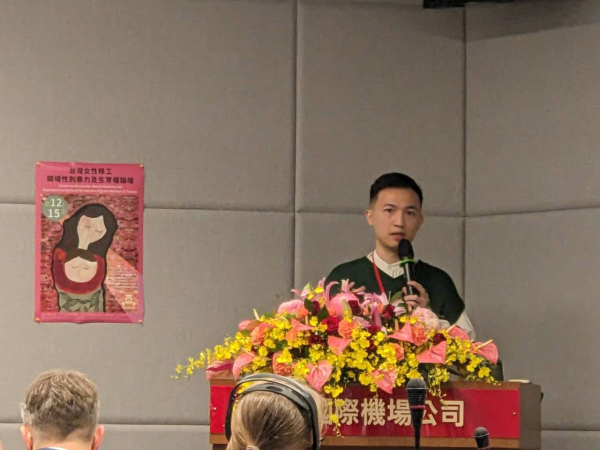
To understand the situation of gender-based violence against female migrant workers in Taiwan, the Taoyuan City Serve the People Association, with funding from the German Institute Taipei, initiated a one-year project focusing on the gender mainstreaming of foreign migrant workers in Taiwan. The association conducted a forum today (15th) to announce the research findings. The results revealed that approximately 16% of respondents reported experiencing gender-based violence. In other words, 1 in 6 female migrant workers is a victim. Moreover, over 90% of gender-based violence incidents occurred among domestic care workers.
Lin Yongpei, a researcher at the Taoyuan City Serve the People Association, stated that this survey is one of the few quantitative investigations in Taiwan focusing on the gender-based violence experienced by female migrant workers. Unlike previous government statistics that only presented the number of migrant workers reporting sexual assault, this survey provides detailed records of the identity of the perpetrators, types of gender-based violence, and the frequency of victimization.
Based on the experiences of 83 victims, it was found that nearly half of the perpetrators were care recipients, and 28% were employers themselves.
Concerning the patterns of gender-based violence, the survey categorized them into inappropriate physical contact, electronic, visual, or verbal harassment, explicit or implied sexual demands, lack of respect for the worker's personal space, and workers being forced to view nudity or explicit content. A significant 31% of victims reported experiencing two or more forms of harassment simultaneously, highlighting that gender-based violence is often a complex interplay of multiple forms.
Regarding the frequency of gender-based violence, less than 40% of perpetrators could be reported or stopped after a single incident. Among the group of victims who experienced gender-based violence multiple times, half of the respondents stated facing harassment or assault on a daily basis.
Why don't migrant workers seek help? Du Guangyu, a director of the Taoyuan City Serve the People Association, pointed out that economic pressure and power imbalances in the employer-employee relationship are crucial factors. He stated, "For example, a care recipient's son raped a female migrant worker on the first floor while the elderly woman (care recipient) was upstairs. The migrant worker did not seek help because the son threatened her, saying, 'If you dare to seek help, I'll send you back (to your home country).' The migrant worker borrowed NT$60,000 to come to Taiwan, and her family pooled money for her to work in Taiwan. Taiwanese men can do these things without using a knife or a gun, just by saying, 'I'll send you back,' and everyone obediently complies. Unfortunately, our prosecutors are unaware of these situations."
Chiu Yufan, an associate professor at Yang Ming Chiao Tung University's Institute of Law, pointed out that the judicial system, lacking cultural sensitivity and familiarity with the situation of migrant workers, can easily cause secondary harm to migrant workers. Therefore, incorporating relevant training content into gender equality courses for law enforcement personnel is an urgent task. Moreover, the higher the risk of victimization, the more legal protection should be provided. This survey shows that over 90% of gender-based violence incidents occurred among domestic care workers, highlighting the need to strengthen protective measures and safeguard the rights of this vulnerable group.
Lin Yongpei, a researcher at the Taoyuan City Serve the People Association, stated that the survey targeted female migrant workers aged 19 to 60 with work experience in Taiwan. The survey took place from May to October of this year, adopting a mixed-mode survey method with telephone interviews as the main mode and online questionnaires as a supplement. In telephone surveys, all interviews were conducted by new residents in their mother tongue. The sample list was randomly selected from a pool of approximately 10,000 participants, including attendees of the community service association's educational activities, recipients of telephone interview care services, and sheltered individuals in placement centers. A total of 410 successful interviews were conducted. For online surveys, Google Forms were used as the answering tool, distributed in various mother tongues to migrant worker online communities. In the end, 112 valid questionnaires were collected. In total, there were 522 valid samples.
〔Radio Taiwan International/ Report from Reporter Chen Nianyi〕2023-12-15 15:32
〔photo from Reporter Chen Nianyi〕
